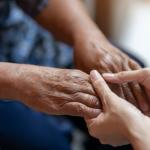
Caring for an aging loved one is a demanding yet rewarding task. Few caregivers juggle all care responsibilities single-handedly, making it advisable to enlist the support of family members and friends to make their role easier. Dividing care should be done with thought.
What are the benefits of dividing care?
Stress naturally accompanies caregiving, as the caregiver is tasked with countless daily responsibilities. But siblings and other family members who work together minimize the caregiving load. The aging care recipient also feels healthier and happier to see their loved ones collaborate with each other.
Seniors do not want to feel like a burden on their families. When responsibilities for elder care are divided in a manner that accommodates each family member’s capabilities, stress-tolerance level, and personal situations, significant weight is lifted off the older adult’s shoulders.
What are examples of care responsibilities?
Families provide the senior with transportation to doctors’ appointments or physical therapy. Helping to maintain the interior and exterior of the older adult’s home are additional tasks caregivers commonly undertake. Preparing meals, managing medications, and running errands are a part of the role.
The abovementioned care tasks are a fraction of the services caregivers normally provide to aging adults. They may also provide emotional support to help the senior handle the difficulties associated with losing their health, independence, and loved ones who’ve passed away.

How do loved ones divide care responsibilities?
1. Develop a care plan
Discussing a senior’s care needs is the first step in developing a care plan. An older adult may need minimal household help at first. But their care needs can progress as time goes on. Therefore, it is important for families to have this discussion periodically throughout their care.
Once an initial care plan is formalized, talk openly with family members to determine individual strengths, like financial management. Rotate responsibilities to maximize fairness. Create a shared calendar so that all individuals involved are aware of each other’s daily and weekly responsibilities.
2. Communicate regularly
Candid conversations between co-caregivers prevent misunderstandings, disagreements, and confusion. Relay health updates, observations regarding the senior’s mobility, incomplete chores or errands, and upcoming doctors’ appointments or planned events. Stay in touch to foster camaraderie with each family member, as well.
Prepare ahead of time by making plans for funeral arrangements and power of attorney for various health scenarios. The more the family care team prepares for the future, the better they are able to handle difficult situations if and when they arise.
3. Prioritize the senior’s quality of life
When multiple caregivers are in the middle of carrying out tasks, the senior’s well-being can get lost in the frenzy. Do not lose sight of the older adult’s physical and cognitive challenges, which can be frustrating for them to experience. Remain united to boost their morale.
By providing consistently compassionate care to an aging loved one, the senior’s mood and outlook often improve. Offer opportunities for the senior to handle some tasks independently or make their own decisions, both of which can boost their self-confidence, self-worth, and dignity.
4. Support each other’s physical and emotional well-being
Co-caregiving sometimes means helping other family members. In fact, indirect assistance can be one of the most effective ways to care for an elderly person. Bring a sibling a meal or pick up their child from school while they take care of the older adult.
Unanticipated schedule changes and setbacks are a part of co-caregiving. Rather than blame other family members, try to show understanding. Brainstorm ways to adjust the current caregiving schedule. Flexibility alleviates stress and panic when situations do not go as planned.

5. Ask for help from a home care agency
Even when multiple family members divide caregiving responsibilities, some needs are best met by experienced elder care professionals. For example, an older parent may feel more comfortable when a senior care professional provides support with intimate hygiene tasks, like bathing.
Hiring a professional caregiver is also vital to avoid the burnout that family caregivers often experience. Respite care allows family members to take a break from caregiving by going on a vacation, socializing with friends, or simply exercising. Practicing self-care helps everyone involved.
Having time for medical checkups and exercise keeps family caregivers healthy so that they can better serve their aging loved one. When family caregivers are well-rested, they are more likely to maintain a good relationship with the senior. Stressed caregivers can easily snap at their loved ones.
Home care agencies provide a range of non-medical services that support both the senior and family. Care options include Alzheimer’s and dementia care to ease dementia symptoms and post-hospitalization care to help seniors recover faster. Trained professionals also provide hospice care.
While several family members may volunteer to provide care to an aging adult, it’s a sensible choice to include Assisting Hands Home Care in the care plan, too. We are a reputable home care agency that prioritizes the health and well-being of seniors who choose to age in place.
Our professional caregivers provide numerous non-medical care services, such as discreet help with bathing, toileting, and other personal hygiene tasks. We prepare and serve balanced meals and beverages so that care recipients stay nourished and hydrated. Caregivers also shop for fresh groceries.
Included in senior care services are transportation to destinations within the community, such as senior centers, doctors’ offices, and the post office. Our companionship ensures older adults remain socially active, which prevents them from succumbing to loneliness, isolation, and depression.
Assisting Hands Home Care customizes each care plan so that it meets individual care needs. As time progresses and care needs change, the care plan can be modified. We’re available for a wide range of care, from 24-hour care to respite care and compassionate memory care.
Elder home care from Assisting Hands Home Care complements aging in place. If extra support, such as respite care, live-in care or 24-hour care, makes sense to your situation, schedule a complimentary in-home consultation with us. We serve Park Ridge, Illinois, and its surrounding communities.
To learn more about our services or to talk to a representative, call us today at (847) 796-6685 or submit a form through our website.




